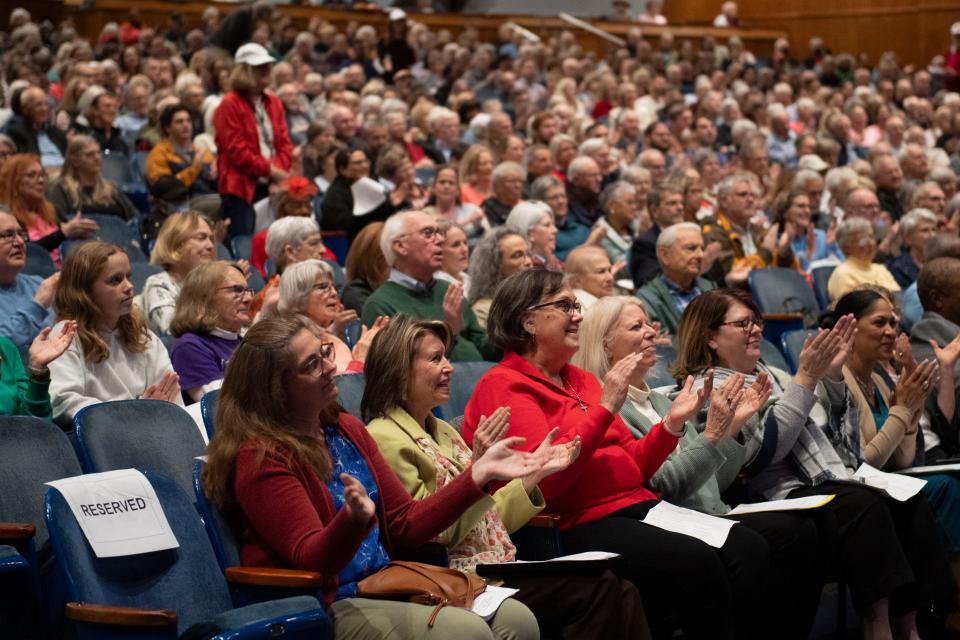'Hold us accountable': Knoxville leaders commit to working with interfaith group on homelessness
- Oops!Something went wrong.Please try again later.
Justice Knox, an interfaith community advocacy group, plans to hold Knox County's leaders accountable on finding solutions for our community's homeless population. And members are ready to pitch in to make things better.
Justice Knox leaders asked Knoxville Mayor Indya Kincannon, Knox County Mayor Glenn Jacobs and Erin Read, executive director of the Knoxville-Knox County Office of Housing Stability, for a seat at the table as they work to address the problem.
"Thank you for encouraging me, as a mayor, and my colleagues," Kincannon said. "We're doing this together and we need your encouragement, we need you to hold us accountable."
At the annual Nehemiah Action Assembly held April 9, Justice Knox Lead Organizer Marjorie Thigpen-Carter asked Kincannon, Jacobs and Read to focus on one specific vulnerable population at a time. Finding short-term shelter and long-term housing solutions is pressing with Knoxville's stubbornly high rent and housing prices, and because of the immediate crisis of the closure of the only low-barrier shelter.
"This creates milestones that can be celebrated, shows that success is possible and builds momentum to solve the next part of the problem," Thigpen-Carter said in a memo.

As the housing stability office creates a 5-year plan to address homelessness, Justice Knox will be involved. Read will include "functional zero homelessness" for certain populations as one of the plan's goals.
Functional zero homelessness is a measurement that means the number of people experiencing homelessness is fewer than number of people utilizing the community's resources. In order to do so, Justice Knox leaders say, the community needs the political will to change up the status quo, public-private collaboration and access to more housing.
Read will pursue a consulting relationship with Julia Orlando, who recently spoke at the local Mayors' Leadership Summit on Homelessness about her efforts to reach functional zero homelessness for veterans in Bergen County, New Jersey.
In terms of housing, Justice Knox will work with Jacobs to identify additional funding sources to support the plan. On the city side, the group wants to work with Kincannon to identify a dedicated revenue source for the Affordable Housing Fund so it can extend beyond the promised 10 years.
The Affordable Housing Fund incentivizes developers building affordable housing. Knoxville recently asked private organizations and nonprofits to contribute to the fund and wants to add an additional $1 million to $2 million to the fund.
Why does this conversation matter now?
More than 1,900 Knox County residents experienced homelessness in the final part of 2023, according to Justice Knox.
The conversation is timely. The Foyer, Knox County's only low-barrier shelter, closed its doors March 31. Low-barrier shelters serve those in immediate need of a roof over their heads who don't meet the requirements set by the main shelters run by nonprofits in the county. They're open 24/7, mainly focus on harm reduction, and clients can get help even if they're not sober. They don't turn people away if they want to stay with their partner or a pet.
The Knox Area Rescue Ministry traditional shelter is open, but it has several specific requirements clients must meet. It is Christian faith-based, and that alone could be a barrier to some. KARM requires clients to be sober and partners are separated by gender. Clients cannot have dogs with them unless they have the right paperwork.
While the Foyer's building is owned by the Salvation Army, it was managed by the Volunteer Ministry Center. That nonprofit walked away because it requires its clients to work to find housing, but it was funded by a federal program that specifically does not allow shelters to mandate a housing search. Read said that wasn't the only reason the Foyer is closing, though. The cost of running the facility was just too high.
"That's why we're starting the process of looking at what it would cost to provide the services that are needed," she said. "I would love it if every service provider in the community would be part of that conversation."
She said our community has diverse providers and it's her office's job to figure out which providers best serve different needs.
What is the five-year strategic plan?
The office of housing stability's five-year plan will serve as a roadmap for addressing homelessness in Knoxville and Knox County.
"It's going to be a process of figuring out what are the needs in the community and what's our capacity to fill (them)? And if we don't have capacity, how do we build it?" Read said.
Read didn't put a date on when the office will finish the plan or make it public, but they're committed to gathering public input. That adds some time to the process.
Knoxville conducted a public input process in 2011 for Compassion Knoxville, a project which sought out recommendations on homelessness. More than 40 meetings were attended by approximately 500 participants, according to a report.
Following those, the city held several targeted meetings designed to reach underrepresented demographic groups, including Black individuals, Hispanic individuals and homeless/formerly homeless individuals.
"The city felt like it was really important to make sure the public was involved in creating the plan. And we still feel that way," Read said.
Allie Feinberg reports on politics for Knox News. Email her: allie.feinberg@knoxnews.com and follow her on X, formerly known as Twitter, @alliefeinberg.
Support strong local journalism by subscribing at knoxnews.com/subscribe
This article originally appeared on Knoxville News Sentinel: Knoxville leaders commit to working on homelessness

